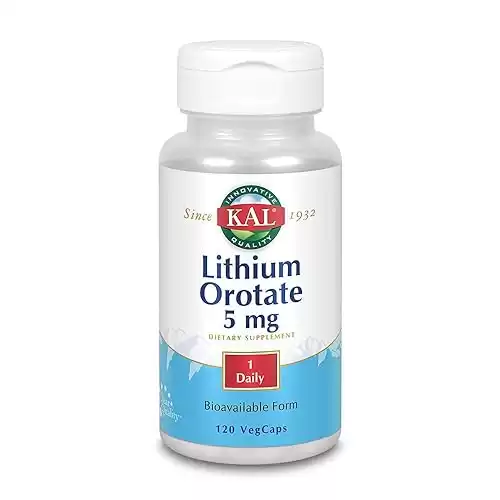Lithium Orotate: Natural Bipolar Treatment
Lithium orotate is the combination of the salt lithium and orotic acid which used to be considered vitamin B13 and it is a natural form compared to conventional lithium treatments. Orotic acid is derived from uracil which plays a role as a prodrug and human metabolite, uracil is a natural component in Panax Ginseng.
Lithium is found from soil, clay beds and rocks in North and South America, in addition to Australia and China. (Pacholko & Bekar, 2021)
Lithium carbonate is the commonly prescribed and more man-made form that was commonly experimented on in the 1960s that it became the more common form prescribed for affective disorders. Lithium carbonate has a narrow therapeutic window, and it can still have an increased concern for toxicity even within the low dosage levels. (Pacholko & Bekar, 2021)
This is NOT medical advice; it is only meant to inform.

Table of Contents
Benefits of Lithium Orotate
It is more natural than the use of medication, it can be purchased online or at a local health food store and it occurs in nature. Therefore, making it overall less-risky, easily accessible and easier to absorb.
Due to the high absorption rate of lithium orotate, lower doses are more effective and higher doses should be avoided.
1. Alcoholism.
Lithium orotate was used in a study with individuals who struggled with alcoholism for long periods of time. 150mg of Lithium Orotate was given for at least 6 months and 10 out of the 42 research participants did not have relapses for as long as 3 years up to 10 years. In addition to lithium, orotate they were given bromelain, magnesium and calcium to help them with liver and heart concerns. (Sartori, 1986)
2. Bipolar Disorder
Bipolar disorder is often treated with Lithium carbonate, however there are many challenging side effects when administering this form. Because lithium orotate can cross the blood brain barrier better, it has a decreased chance of toxicity compared to lithium carbonate.
Around 25% of individuals suffering with bipolar disorder attempt suicide.
The use of lithium had been decreased for quite some time due to the introduction of antipsychotics, however they also pose great side effects as well.
Lithium works by inhibiting the enzymes Glycogen synthase kinase 3 (GSK3) and IMPase which are at the root of bipolar disorder symptoms. Lithium orotate can also reduce inflammation which is a contributing factor in bipolar disorder. Increased GSK3 disrupts the circadian clock and contributes to mania. Lithium orotate supplementation helps reduce the elimination of (BDNF) brain-derived neurotropic factor which is typically lower in individuals with bipolar disorder. (Pacholko & Bekar, 2021)
3. Suicide
This is not a claim and it’s not something to take lightly, however research shows that bipolar sufferers are 20-30 times more likely to commit suicide.
Lithium has been shown to decrease in suicide attempts. Lithium effects serotonin as well and can help with the manic episodes and depressive phases of bipolar disorder. Lithium is proven to be more effective than antidepressants in managing bipolar disorder. (Benard et al., 2016)
4. Schizophrenia
Individuals who struggle with schizophrenia tend to have a hard time sticking to their medications because of the side effects. This is predominantly from the antipsychotics.
Between 1/3-1/2 of schizophrenic patients appear to gain benefits from lithium treatment. However, the research is limited, making it hard to argue the benefits as strongly. Lithium was more effective in individuals with schizoaffective disorder than schizophrenia. (Leucht et al., 2015)
History of Lithium
Lithium Citrate– It was hypothesized that increased amounts of uric acid in the body contributed to mania in bipolar depression, lithium citrate was successful in reducing gout (high levels of uric acid). However, it was dismissed due to lithium chloride being unable to manage hypertension and higher doses caused deaths back in 1949 so the FDA (Food and Drug Administration) stopped all use of lithium.
Later on, research was done to better assess the levels of lithium in the blood in order to reduce toxicity. This is when lithium carbonate was being studied
Side Effects
When taking the conventional form of lithium carbonate there are risks for hypothyroidism and kidney impairment.
However, lithium orotate is better absorbed, making it much harder to overdose on. This is because in small amounts it is more effective and with less side effects.
Higher doses like that in regular lithium prescriptions can cause nausea, diarrhea and dizziness.
Where Can You Buy Lithium Orotate?
Lithium orotate is a dietary supplement that can be purchased in a health food store in either tablet or a capsule form. You can also purchase it on amazon as shown below and the dosage is low to where there is little to no risk of toxicity. However, it is effective in raising lithium levels because of its ability to cross the blood brain barrier.
In Summary
Lithium orotate is a less toxic form of lithium compared to other forms such as the commonly prescribed lithium carbonate. Lithium has been used for many years to treat bipolar disorder and this more natural form reduces the side effects. Other supplements that are useful for depression include niacin, and other natural antidepressants.
References:
Benard, V., Vaiva, G., Masson, M., & Geoffroy, P. A. (2016). Lithium and suicide prevention in bipolar disorder. L’Encephale, 42(3), 234–241. https://doi.org/10.1016/j.encep.2016.02.006
Leucht, S., Helfer, B., Dold, M., Kissling, W., & McGrath, J. J. (2015). Lithium for schizophrenia. The Cochrane database of systematic reviews, 2015(10), CD003834. https://doi.org/10.1002/14651858.CD003834.pub3
Pacholko, A. G., & Bekar, L. K. (2021). Lithium orotate: A superior option for lithium therapy?. Brain and behavior, 11(8), e2262. https://doi.org/10.1002/brb3.2262
Sartori H. E. (1986). Lithium orotate in the treatment of alcoholism and related conditions. Alcohol (Fayetteville, N.Y.), 3(2), 97–100. https://doi.org/10.1016/0741-8329(86)90018-2
Originally posted 2022-04-12 03:43:36.
Megan Santiago
Latest posts by Megan Santiago (see all)
- How to break a Fever - March 10, 2024
- Transdermal Magnesium: Best Kept Secret You Need to Try - January 3, 2024
- Porn Addiction Side Effects: How to Stop Now - January 3, 2024

